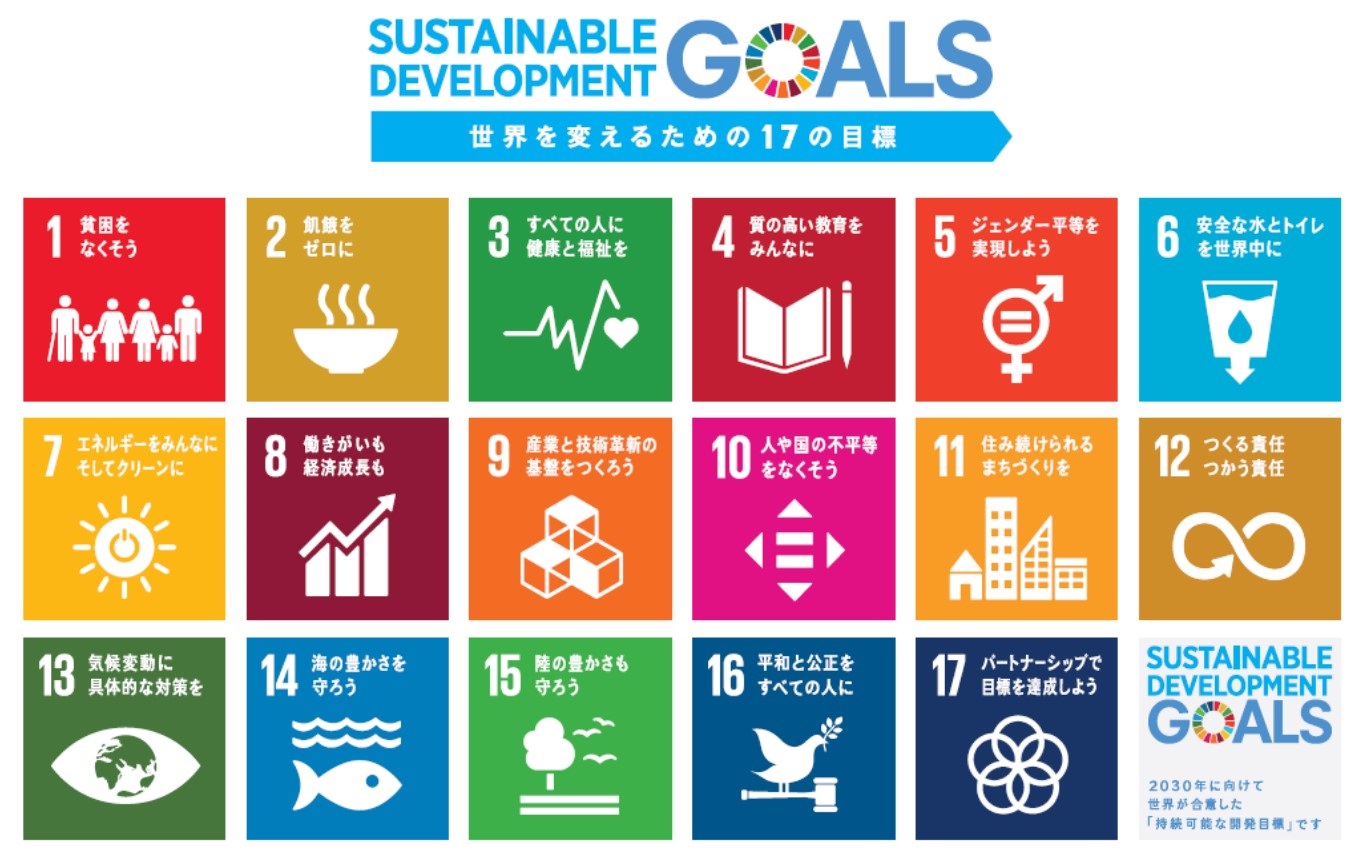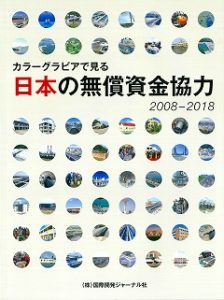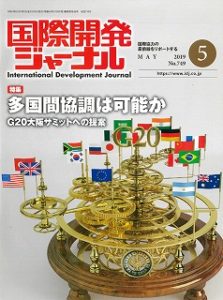SDGs Nurtured by the Business Community Effective for Japan’s Economic Reform
IDJ ENGLISH
『International Development Journal』 2019 May edition
SDGs Declaration of Japanese Companies
The Sustainable Development Goals (SDGs) are becoming very pervasive in Japanese society at an amazing pace. This is a noteworthy historical event. As is well known, SDGs are development targets to be realized in 2030, that were adopted at the UN Sustainable Development Summit held in September 2015. In the past, Japanese society, particularly the business community, has not incorporated UN action guidelines into their management. What is the background to this?
Recently, in late March, the watch manufacturer, Citizen Watch Co., Ltd. defined their two brands of women’s watches as part of their “SDG line-up”, and announced that it will sell special limited products with an emphasis on environmental considerations. Since 2006, the company has donated a portion of its sales to NGOs that support women in developing countries. They see themselves as cooperating with the diffusion of SDGs, playing the role of an advertising tower for SDGs right now.
On the other hand, Konica Minolta Co., Ltd. aims to achieve the SDG Goal 3 of “Health and Welfare for All” in Japan. We are helping to reduce the burden on caregivers by creating smartphones for the elderly. The SDGs advocated by the United Nations have now been incorporated into the corporate philosophy of the company and are now becoming widespread.
In the business world, the Japan Federation of Economic Organizations (Keidanren) and the National Bankers Association have already incorporated SDGs into their “Code of Conduct”. In particular, it should be noted that the Japan Securities Dealers Association announced its “SDGs Declaration” in March 2018. While the Japan Securities Dealers Association contributes to the achievement of SDGs, the securities industry, itself, aims to achieve sustainable growth, and has set the following four guidelines:
(1) Efforts to eliminate poverty, hunger and protect the global environment (with the aim of solving social issues through financing and supply functions in the securities market, etc.)
(2) Efforts to support reform of working styles and activating women (aiming to create workplaces with a good work experience through the promotion of work and life balance, etc.)
(3) Efforts to support education for the socially vulnerable (support for children in various environments (aiming to realize a society in which all opportunities are given equally)
(4) Efforts to improve awareness and understanding of SDGs (also aiming to improve awareness and understanding of SDGs at home and abroad)
Global Scale Concepts
A major feature of the “SDGs Declaration” is the company’s internal and external integration philosophy. The declaration not only gives a global concept, but also mentions reforms in working styles, support for active women, and educational support for the socially vulnerable, and it is also disseminated internally. In the past, the weak were always on the developing side, and Japan was always on the other side. Moreover, the government’s development assistance (ODA) project seemed to be the job of the government, and many Japanese may have always thought of it as something else.
However, the securities industry’s SDGs declaration seeks to integrate the management philosophy inside and outside of the country, referring also to the relief of vulnerable people in Japan and the improvement of their status. Japan also clearly states that there are many aspects that must be reformed through SDGs. Such a way of thinking might be accepted by many Japanese people as one’s own thing, not just as a matter for others, with the improvement of public awareness, and it will also enter break into Japanese society in the blink of an eye.
How should we consider these phenomena? It is also a consideration to compare this with the speed of disseminating ODA to the people. As well known, the ODA public relations are also long with the history of ODA. October 1 is designated as “the day of international cooperation” every year, and has focused on public relations at various places. However, the spread of understanding is limited, and corporate interest is limited to some companies involved in ODA projects. This is despite the fact that ODA’s aid goals are almost the same as SDGs.
In the end, what made the difference in spread and transmission?
The SDGs set in the United Nations are high in policy purity in terms of global consensus building and do not reflect the political views of large countries. This is because it is a global idea that includes the country to be supported and the country to be supported. In other words, the sense of policy purity differs from developed country assistance (ODA). Whether in the West or in Japan, during the East-West Cold War, aid was used as a policy tool to concentrate on the East-West camp battle. After the Cold War, whether political or economic, it began to use ODA explicitly as a means to pursue national interests, although developed countries say global issues are primary to the meaning of ODA.
Japanese Companies Going to the World
Next, considering SDGs at the general society level, the general public including companies, has a sense of global crisis, and the global crisis can no longer be saved by ODA used as a means of diplomacy. This sense of crisis spreads to the business world, and many companies incorporate SDGs in their management philosophy, raising awareness of contribution to the world, and adopt SDGs philosophy to full-scale globalization of companies and awareness reform among staff.
Even though ODA pursues the same goals as SDGs, companies do not learn from the “ODA Charter” or the Japan International Cooperation Agency (JICA) because non-international national interest is attached to it. Business codes of conduct are now going to be globalized across countries. Future Japanese companies cannot live without thinking and acting on a global scale. The SDGs Declaration, which plays an important role in the financing of firms, strongly feels the company’s future-oriented attitude.
Another trend is that the flow of global funding to promote international development is undergoing major changes. Global funding flows are 90% private capital and 10% government funding. Private capital is globalizing itself and is in a position to be deeply involved in global issues. So, even in African development, which is attracting attention as a big future market, the expectation for private capital, which accounts for 90% of the flow of global funds, is high.
Japan should also partner with industry towards SDGs and open the way for larger SDGs while also making ODA seed money for development.
Japanese society has never before enjoyed such a global concept of SDGs. Don’t let this social change end in an anticlimax.
***** 以下、日本語原文 *****
羅針盤 経済界に根づくSDGs—その意味するところを考える
企業のSDGs宣言
持続可能な開発目標(SDGs)が、驚くべき勢いで日本社会に浸透している。これは特記すべき歴史的な記録である。
周知のとおり、SDGsは2015年9月に開かれた「国連持続可能な開発サミット」で採択された、30年を目標年次とした開発目標である。これまで日本の社会、特に経済・産業界が国連の行動指針を経営の中に取り込むことはなかった。これにはどういう背景があるのか。それが今回のテーマである。
最近では、3月下旬、時計メーカーのシチズン時計(株)が女性向け腕時計の2ブランドを「SDGs銘柄」に位置付け、環境への配慮などをテーマにした特別限定商品を販売すると発表した。同社は2006年から売り上げの一部を開発途上国の女性を支援するNGOへ寄付している。現在もSDGsの伝播に協力し、まさにSDGsの広告塔の役割を果たしている 。
一方、コニカミノルタ(株)は、SDGsの目標3「すべての人に健康と福祉を」の国内での実現を目指している。高齢者介護においてスマートフォンによる状況把握システムを構築して、介護者の負担軽減に貢献しているのである。国連の掲げたSDGsは、今や企業の経営理念の中に取り込まれ、大きな広がりを見せている。
経済界では、すでに(一社)日本経済団体連合会(経団連)と(一社)全国銀行協会が「行動憲章」の中にSDGsを取り込んでいる。なかでも注目すべきは、企業の総本山とも言うべき日本証券業協会が2018年3月、「SDGs宣言」を公表したことだ。
日本証券業協会はSDGsの達成に貢献するとともに、証券業自らも持続的な成長を目指すとしており、次の4つの指針を掲げている。
(1)貧困、飢餓をなくし、地球環境を守る取り組み(証券市場の資金調達・供給機能などを通じて社会課題の解決を目指す)
(2)働き方改革、女性活躍を支援する取り組み(ワーク・ライフ・バランスの推進などを通じて、働きがいのある職場づくりを目指す)
(3)社会的弱者への教育支援に関する取り組み(様々な環境に置かれている子どもたちへの支援を通じて、あらゆる機会を平等に与えられる社会の実現を目指す)
(4)SDGsの認知度および理解度の向上に関する取り組み(本協会および会員証券会社の役職員のSDGsに関する当事者意識を高める、また国内外におけるSDGsに対する認知度および理解度の向上を目指す)
一方、コニカミノルタ (株)は、SDGsの目標3「すべ ての人に健康と福祉を」の国内で の実現を目指している。高齢者介護においてスマートフォンによる 状況把握システムを構築して、介 護者の負担軽減に貢献しているの である。国連の掲げたSDGsは、 今や企業の経営理念の中に取り込 まれ、大きな広がりを見せている。 経済界では、すでに(一社)日 本経済団体連合会(経団連)と (一社)全国銀行協会が「行動憲章」の中にSDGsを取り込んでいる。なかでも注目すべきは、企業の総本山とも言うべき日本証券業協会が2018年3月、「SDGs宣言」を公表したことだ。 日本証券業協会はSDGsの達成に貢献するとともに、証券業自らも持続的な成長を目指すとしており、次の4つの指針を掲げている。
(1)貧困、飢餓をなくし、地球環境を守る取り組み(証券市場の資金調達・供給機能などを通じて社会課題の解決を目指す)
(2)働き方改革、女性活躍を 支援する取り組み(ワーク・ライフ・バランスの推進などを通じ、働きがいのある職場づくりを目指す)
(3)社会的弱者への教育支援 に関する取り組み(様々な環境に置かれている子どもたちへの支援を通じ、あらゆる機会を平等に与えられる社会の実現を目指す)
(4)SDGsの認知度および理解度の向上に関する取り組み(本協会および会員証券会社の役職員のSDGsに関する当事者意識を高める、また国内外におけるSDGsに対する認知度および理解度の向上を目指す)
地球規模の発想
「SDGs宣言」の大きな特徴は、企業の内外一体化思想であろう。宣言は世界的発想に立つだけでなく、働き方改革や女性活躍支援、社会的弱者への教育支援などにも触れており、内に向けても発信されている。これまでの途上国援助思想では、弱者はいつも援助される途上国側にあり、日本は常に援助する側であった。しかも、政府開発援助(ODA)事業は政府の仕事であると思われ、多くの日本人にはいつも他人事のように考えられていたのではなかろうか。
しかし、証券界のSDGs宣言は、日本の弱者救済、地位の向上にも言及しながら、経営理念の内外一体化を目指す。日本自身にSDGsを通じて改革しなければならない面が多いことを明示している。こうした考え方が、国民意識の向上とともに、他人事ではなく、自分の事として多くの日本人に受け止められ、燎原の火のように日本社会に瞬く間に浸透したのではないだろうか。
私たちは、こうした現象をどう考えればよいのだろうか。これをODAの国民への伝播スピードと比べてみることも一考である。周知のように、ODAの歴史とともにODA広報も長い。毎年10月1日は「国際協力の日」と定められ、さまざまな所で広報活動に力を入れてきた。しかし、その理解の広がりは限られた範囲にとどまり、企業の関心もODA事業に関わりを持つ一部の企業に限られている。ODAの援助目標がSDGsとほぼ同じであるにもかかわらずである。
いったい、何が普及伝達の差を生み出したのか。国連を舞台とするSDGsは、世界の合意形成という点で政策的純度が高く、大国の政治的思惑などが反映されてない。なぜなら、援助する国、される国を包含する地球的規模の思想であるからだ。つまり、先進国援助(ODA)とは政策的純度が異なる。欧米にしろ日本にしろ、東西冷戦時代には援助を政策的手段として利用して、東西陣営の陣取り合戦に専念した。冷戦崩壊後は、政治的であろうが経済的であろうが、ODAを国益追求の手段として露骨に使うようになった。また、先進諸国は地球的規模の問題と言いつつも、ODAの第一義は国益追求である。したがって、地球的規模の問題(SDGs)は国連にゆだねることになった。これには援助する国、援助される国を包含した問題としての意味が込められている。
世界へ向かう日本企業
次いで、SDGsを一般社会レベルで考えてみると、昨今の企業を含む一般市民は、地球的な危機感を高めており、もはや地球的危機は外交の手段として使われているODAでは救えないと考え始めている。その危機意識は実業界にも広がり、多くの企業も経営理念の中にSDGsを取り込み、世界への貢献意識を高めるとともに、企業の本格的な世界化と職員の意識改革にもSDGs思想を採用しているように見える。
ODAは、SDGsと同じ目標を追求しているにもかかわらず、企業が「ODA大綱」あるいは国際協力機構(JICA)に学ばないのは、背後に非国際的な国益がはりついているからであろう。今や企業の行動規範は国を越えて世界化しようとしている。これからの日本企業は世界的規模で考え、行動しなければ生きていけない。企業の資金調達という面でも重要な役割を果たす日本証券業協会が「SDGs宣言」をしたことに、企業の未来志向を強く感じる。
もう一つの流れは、国際開発を促進する世界的資金の流れが大きく変化していることである。世界の資金の流れは90%が民間資本、10%が政府資金だ。民間資本は自ら世界化し、地球的規模の問題にも深く関わらざるを得ない立場に立たされている。だから、大きな未来市場として注目されるアフリカ開発でも世界の資金の流れの90%を占める民間資本への期待は大きい。
日本もSDGsに向けて産業界と組んでODAを開発のシード・マネーにしながらより大きなSDGs実施に向けた道を切り開くべきである。
日本社会がこれほどSDGsという地球的規模の思想を享受したことはない。この社会的変化を龍頭蛇尾に終わらせてはならない。
『国際開発ジャーナル』主幹 荒木 光弥


国会議事堂202004.jpg)


